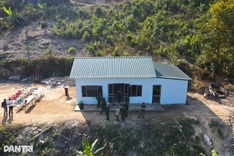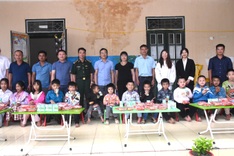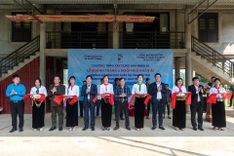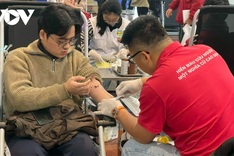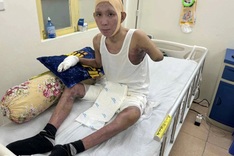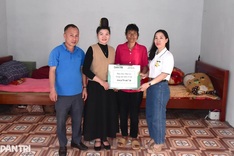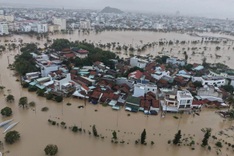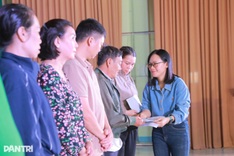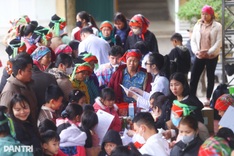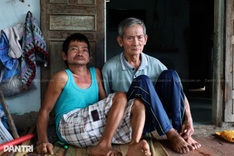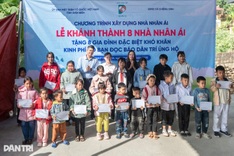Riding on the success of a major recent bust, the Wildlife Conservation Society is raising public awareness and taking the fight to wildlife consumers.
 |
| Tran Xuan Viet |
Tran Xuan Viet is described by WCS Vietnam director Scott Roberton as, “Having the potential to be one of this country’s leading conservation figures.”
As program officer at WCS Vietnam he oversees research, training and recent raids that have struck at the heart of Vietnam’s illegal wildlife poachers, traffickers and wildlife restaurants.
His love of wildlife is sadly still considered a rare quality in Vietnam but his dream is to change that point of view. To this extent he has also given up lunchtimes and evenings to work with young people in his co-ordination of the Go Green Environment Club.
Attitudes are slow in changing but they are changing. Viet sees wildlife as the natural heritage of the people of Vietnam, an asset that must be safeguarded for all and future generations to enjoy.
Now WCS stands on the brink of a simple, but challenging, new aim – to cut the consumption of endangered wildlife to zero in Vietnam.
Viet will be at the heart of that movement.
What are the most alarming and concerning facts about wildlife consumption and poaching in Vietnam?
Most alarming is that many wildlife consumers and hunters don’t believe eating or hunting endangered wildlife is a big deal. There is little understanding of the concept that these animals are endangered at all because law enforcement has traditionally been lax in this area so they also don’t fear reprisals.
 |
| Viet examines and identifies wildlife discovered during a recent raid |
I believe we are only just starting to change these attitudes. People are slowly realising that this is serious. At the same time we too are getting serious. There comes a point where we say “enough” and we ask people to stand up and be counted in this fight.
What are the main objectives of WCS in Vietnam?
WCS is commited to stopping the trafficking of endangered wildlife and Vietnam is vital in this fight. First of all, it remains a major consumer of endangered wildlife but it is also a transit country – funnelling endangered wildlife from across the world towards new markets and China, in particular. In terms of WCS’ worldwide strategy, the importance of success in Vietnam is paramount.
What has WCS accomplished thus far in Vietnam?
Our work to date has been about building momentum in order to win this fight. It starts with collecting reliable data on the organisation and dynamics of the wildlife trade in Vietnam. The next step was to work with law enforcement.
At each step we are building a consensus and an increasingly large movement against a potentially irreversible depletion of Vietnam’s natural heritage. We aim to make sure people know just how serious this is.
The recent raid at Lam Dong, which netted 350 kilo(gram)s of wildlife, was covered extensively in the Vietnamese media. But it also made headlines in the New York Times and the Huffington Post. On this issue the world is watching Vietnam. This country’s reputation is at stake – not just in terms of its environment but also wider issues such as its commitment to law enforcement.
 |
| The skins of two endangered black-shanked Duoc Langurs |
How actively is WCS working with the government and relevant agencies in Vietnam?
WCS has developed and sought out opportunities to work with various agencies in Vietnam that relate to the wildlife trade. At a national level, we are working with the Forest Protection Department (FPD - MARD), Vietnam CITES office, Biodiversity Conservation Agecy (MONRE) and the General Department of Customs. At the provincial level, we have partners in provincial FPD, DARD, the Environment Police, Economic Police, Border army, Customs and Market Control.
The next step is to work with the private sector and state industries. Evidence suggests that business people are the prime consumers of wildlife. We are in the process of looking to sign up partners who will ensure their HR policies expressly forbid this. We’re also looking for everyone to put pressure on the government, industry and the media. No single business or individual owns Vietnam’s wildlife – so why should they profit from it? They are stealing, not only from all of us, but also our children and grandchildren.
Does WCS have solid cooperation and a strategy with the Vietnamese government?
We work in cooperation with the Vietnamese Government and we enjoy their support. However, it is always about priorities and resources. We, of course, want this fight to be a higher priority and enjoy much greater resources. The Vietnamese government has proved that it can be extremely flexible and fast moving where there is the political will.
We want the government to decide that it will no longer tolerate any wildlife poaching and trafficking and to commit to stamping it out in its entirety. If there is the will then this battle is very winnable.
 |
| Frozen pangolins, bear paws, civets and mouse deer filled the freezers at a restaurant raided in September. |
Many people claim that some of the biggest contributors to this industry in Vietnam are actually Vietnamese officials. Do you have any comment?
The average profile of an individual who eats wildlife is rich, male and successful in what they do. That goes across the board from executives in private companies through to the public sector. We need to change attitudes everywhere. We are enjoying progress, however, in Dong Nai province, working with DARD, we have developed an agreement with government offices that they will not participate in the consumption of endangered wildlife.
What is the most shocking case you have come across in your career?
The recent Lam Dong raid was bittersweet for us. It represented a huge breakthrough that really felt like that we had started to turn the tide.
However, it is hard to feel triumphant for long when you’re having to identify and document dead endangered wildlife. Serrows, langurs, leopard cats, clouded leopards and bears. It was horrifying and I think the photos that appeared in the media shocked a great many people. This is what we are up against.
Is WCS working to educate and spread awareness to the general public?
I think that is the next step. So far we have worked with partners and with government. We are now turning increasingly to the public at large and requesting their commitment to this cause.
 |
| Civets made up a large proportion of the wildlife seized during a September raid. |
How do you go about changing the minds of people who truly believe in the powers of consuming wildlife?
We show them that their beliefs have no scientific basis. Increasingly, there is evidence that, in certain cases, wildlife can actually carry disease. We also must educate that eating endangered wildlife is illegal. A jail sentence will not benefit your health. People also need to realise that this is Vietnam’s natural heritage. Once it is gone, it is gone forever. If we have pride in our country then that must include not just our achievements but also the beauty of Vietnam. Our wildlife is part of that.
Are the penalties in Vietnam strict enough to deter future violations?
The biggest penalty for wildlife violation is seven years imprisonment for criminal cases and 500 million VND in administrative cases. We believe that stricter sentencing will occur only once this has been given a greater priority and there is a greater desire to achieve zero endangered wildlife consumption.
| If you are interested in safeguarding endangered wildlife in Vietnam, WCS Vietnam has a Facebook page where you can gain the latest news on the subject as well as joining in the debate surrounding these issues: http://www.facebook.com/wcs.vietnam |

